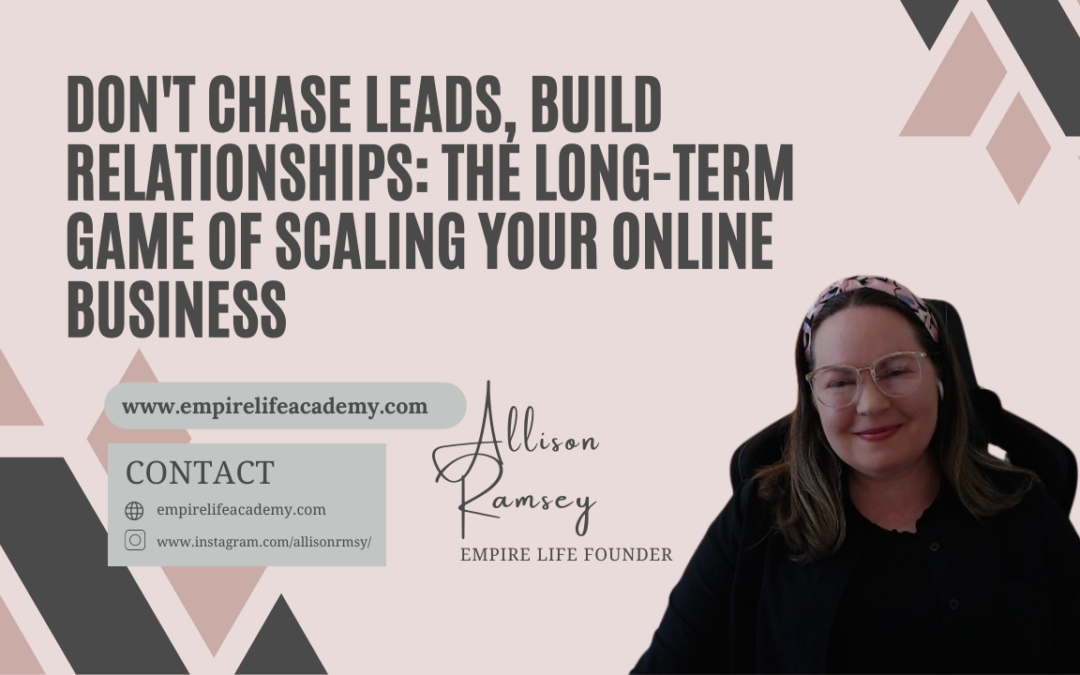The “It Won’t Happen to Me” Syndrome: Why Female Entrepreneurs Need a Plan of Action to be Proactive
Almost every successful female founder started their journey with unwavering grit and determination. You faced the challenges of the entrepreneurial world head-on, defying odds and establishing a thriving business. Yet somewhere along the line, a subtle shift can occur.
As wins accumulate, it’s easy to slip into a comfortable sense of security––the unspoken belief that your business has achieved a level of immunity. This is the insidious “It Won’t Happen to Me” syndrome.
Let’s be honest –– we’ve all experienced moments of this dangerous overconfidence. Maybe it’s an underlying assumption that the market conditions that propelled your growth are permanent. Perhaps, the past victories lull you into thinking that your strategies are foolproof.
The truth is, no business, no matter how robust, is completely immune to unexpected crises.
Pandemics, economic downturns, technological disruptions––these are forces beyond any individual entrepreneur’s control. Yet, far too often, seasoned female founders fall prey to the illusion of invincibility. This complacency leaves businesses dangerously exposed.
The goal of this blog is not to instill fear, but to ignite a proactive mindset. Recognizing the risk of “It Won’t Happen to Me” thinking is the first step towards crisis-proofing your business. It’s time for a reality check, a strategic shift that turns resilience into a core pillar of your continued success.
The truth is, preparation breeds confidence, and in the ever-changing entrepreneurial landscape, true confidence lies in being ready for anything.
———–
Your Business ROI
All of coaches and female-led businesses who implemented Empire Life’s business strategies in client leads, monthly income (often a 20X increase from when they started with Empire Life’s support), and client retention after having Empire Life Mentorship, apply here.
————–
I get it.
You’ve had a taste of success.
You felt like you’re finally beating the odds and the strategies you’ve painstakingly developed are now bearing fruit. Years of hard work and sacrifice have solidified your business, making it a recognized force in your industry.
However, with success often comes a dangerous side effect: complacency.
Let’s explore why this is a problem faced by many established female founders.
The Illusion of Invincibility
When your business has navigated past challenges and secured a degree of stability, it’s easy to fall into the trap of believing your venture has reached a state of invincibility. After all, you’ve survived previous hurdles; why wouldn’t you continue to thrive? The hard truth is that yesterday’s winning formula isn’t always a guarantee of tomorrow’s success. This false sense of security prevents you from proactively preparing for the inevitable curveballs that the business world will throw your way.
The “This Time It’s Different” Mindset
We all like to believe that we’ve learned from our past experiences. However, female founders, driven and resilient as we are, can fall prey to the “this time it’s different” mindset. When faced with new challenges or potential disruptions, we can downplay the risks under the assumption that we’ve “seen it all before.” This leads to underestimating potential threats and overconfidence in our ability to navigate them based solely on past experiences.
Let’s be frank: every crisis is shaped by unique circumstances. What worked in weathering a previous storm might not be effective the next time around. Assuming that our established playbook is always adequate hinders our ability to adapt and innovate, leaving businesses dangerously vulnerable.
Signs of Complacency
Complacency doesn’t announce itself with flashing sirens. It’s a subtle erosion of proactive thinking. Here are some key signs to watch out for:
Lack of Scenario Planning: Are you actively exploring “what if” scenarios for various potential crises? Or are you operating under the assumption that things will largely continue as they are?
Outdated Business Continuity Plans: Many businesses have plans in a dusty binder somewhere. However, when was the last time they were updated, tested, and practiced?
Minimal Cash Reserves: Running your business with a lean mentality is wise, but are you leaving too little room for unexpected expenses or dips in revenue?
Neglecting Market Shifts: Staying in tune with evolving customer needs and industry trends is vital. Are you consistently reassessing your offerings, or are you relying on what’s worked in the past?
Complacency is a dangerous gamble. It undermines your business’s resilience and makes you blind to potential threats that could derail even the most seemingly stable ventures. Acknowledging the dangers of this mindset is the first and most crucial step in protecting your hard-earned legacy.
————–
For the female businesses who are scaling, who are already making over $20,000USD-$40,000USD per month, there needs to be a different and unique level of support, just for you. This leads me to our mastermind (doors opening soon!!), and masterminds in general to be a part of, contact us and apply here.
————–
Real-World Examples of Crisis
No one expected COVID-19. The pandemic served as a brutal wake-up call, exposing the hidden vulnerabilities within seemingly stable businesses. However, it’s crucial to remember that unexpected crises come in many shapes and sizes.
Let’s delve into a few real-world examples that illustrate why crisis-proofing your business is essential for long-term survival and success.
The COVID-19 pandemic was a global crisis that impacted businesses on an unprecedented scale. Many businesses, especially those female-led, found themselves disproportionately affected. Lockdowns, supply chain disruptions, and rapidly shifting consumer behavior left even well-established companies scrambling to adapt.
The pandemic highlighted the dangers of over-reliance on in-person business models, the fragility of supply chains, and the importance of having sufficient financial reserves to weather prolonged periods of uncertainty. It was a powerful reminder that even seemingly global events can have devastating local consequences.
In our digital age, many businesses rely heavily on platforms like Facebook, Instagram, or other digital channels for marketing, sales, and customer communication. However, when these platforms go down, it can cause significant disruptions, especially for businesses that haven’t diversified their digital presence.
Outages serve as a wake-up call, reminding us that even the tech giants we often take for granted are not immune to disruptions. They highlight the importance of having contingency plans for when our primary channels of communication or sales become suddenly unavailable.
Economic downturns, even localized ones, can have a ripple effect across industries. Consumer spending habits change, investors become cautious, and even seemingly thriving businesses can face unexpected challenges.
During economic downturns, having a strong financial foundation and a diversified customer base becomes even more critical. The ability to quickly adapt your offerings, pricing strategies, and marketing can mean the difference between merely surviving and finding new opportunities for growth.
Natural disasters such as floods, hurricanes, earthquakes, or wildfires can cause widespread physical damage and logistical chaos. While geographically localized, their effects can extend far beyond the directly impacted areas. Supply chain disruptions, labor shortages, or shifts in regional consumer priorities can have consequences for businesses even at great distances.
These events highlight the importance of having business continuity plans that address potential physical disruptions, as well as the need for strong partnerships with suppliers and logistics providers who can help you navigate unforeseen challenges.
The Lesson: Prepare for the Unexpected
Crises, by their very nature, are unpredictable. They can strike at any time, taking many forms. While we can’t anticipate every specific scenario, we can and absolutely should develop a mindset of preparedness.
Complacency is the enemy of resilience. The businesses that successfully weather storms are those led by founders who recognize that the landscape is constantly shifting. They operate with a healthy degree of proactive vigilance, continuously assessing potential vulnerabilities and developing strategies to mitigate risks. It’s this type of forward-thinking that will not only safeguard your business but set you up for continued growth, even amid uncertainty.
———–
Have you had a chance to grab our best-selling book, with women’s stories of their rising to success, and Redefining their success?
If you want to be featured in the upcoming book RECLAIM, Series 2, are you a female founder, with an incredible story to share with millions to inspire them, apply here.
———–
The Path to Crisis-Proofing
While we cannot completely eliminate the risk of crises, we most certainly can empower ourselves to face them with greater resilience. Crisis-proofing your business is not about living in a state of perpetual anxiety. It’s about smart, strategic preparation that fosters confidence and positions you to capitalize on opportunities – even during adversity. Here’s your roadmap for building a more resilient business:
Develop a Crisis Management Plan
Don’t wait until disaster strikes to figure out what to do. A comprehensive crisis management plan outlines specific steps to be taken in the event of disruptions, providing clarity amidst chaos. Here’s what your plan should include:
Crisis Team: Identify key personnel responsible for decision-making and communication during different crisis scenarios. This team should have diverse skill sets and the authority to act decisively.
Communication Protocols: Who will communicate with stakeholders, including employees, customers, investors, and the media? How and when will updates be shared? Pre-drafted communication templates can save valuable time in a crisis.
Operational Adjustments: Outline procedures for adapting your operations in various scenarios. This might include remote work protocols, supply chain backup plans, or scaling back services if needed.
Financial Contingency Plans: Determine how you’ll access additional funds if necessary and identify areas where expenses can be quickly reduced to preserve cash flow.
Diversify Revenue Streams: Relying on a single revenue source increases your vulnerability. Explore ways to expand your offerings, target new customer segments, or develop passive income streams. Diversification creates a safety net, ensuring that if one area of your business is impacted, others can help carry the load.
———–
For the female businesses who are scaling, who are already making over $20,000USD-$50,000USD per month, there needs to be a different and unique level of support, just for you. This leads me to our mastermind (doors opening soon!!), and masterminds in general to be a part of, contact us and apply here.
———–
Embrace Digital Agility
The businesses that pivoted most effectively during the pandemic were often those already steeped in digital operations. Here’s what you should focus on:
Robust Online Presence: Can your business seamlessly shift to online sales or service delivery if needed? Does your website provide a user-friendly experience that converts?
Digital Marketing Mastery: Develop the skills to reach customers effectively through online channels. Don’t just rely on a few familiar platforms—diversify your online marketing strategies.
Virtual Communication Tools: Invest in technologies that enable seamless remote collaboration and communication within your team and with your clients.
———–
Have you joined Quora yet? To speak your mind, ask questions, and display yourself as an expert there.
———–
Build a Strong Network
Your business doesn’t exist in a vacuum. Cultivating strong relationships with mentors, industry peers, and potential partners can prove invaluable during a crisis.
Mentors and Advisors: Seek guidance from experienced individuals who have weathered storms in the past. They can offer insights and help you avoid common pitfalls.
Industry Collaborations: Identify potential partners for strategic collaborations that could mitigate risks or open up new opportunities during a downturn.
Community Support: Engage with local business organizations and networks. A strong community can provide resources and a sense of solidarity when times are tough.
Financial health is the backbone of a crisis-proof business. Here’s where to focus your efforts:
Healthy Cash Reserves: Aim to maintain sufficient cash reserves to cover several months of operating expenses. This provides a buffer in case revenue takes a sudden dip.
Access to Credit: Secure lines of credit before you need them. It’s easier to get access to additional capital when your business is performing well.
Expense Control: Regularly review your expenses and identify areas where you can cut costs without compromising core operations. This creates flexibility in case you need to tighten your belt quickly.
Remember: Continuous Adaptation is Key
Crisis-proofing isn’t a one-time project— it’s an ongoing mindset. Make these practices a regular part of your business strategy:
Scenario Planning: Regularly conduct tabletop exercises with your team to simulate different crisis scenarios and brainstorm responses.
Review and Update: Review your crisis management plan and financial contingency plans annually (or more often) and update them as needed.
Market Monitoring: Stay attuned to changing industry trends, emerging technologies, and shifting consumer behaviors. Proactive adaptation is always easier than scrambling to catch up.
Crisis-proofing your business is an investment in its longevity and your own peace of mind. By embracing these strategies, you’re not just preparing for potential storms, but you’re also positioning your business for continued growth and success – no matter what the future holds.
———–
With heavily investing in ourselves there is also no need to invest in multiple online courses and masterminds which are not geared toward the woman scaling her business.
We are launching our women’s and invite only Empire Life Mastermind for female founders who are scaling their businesses, and can display in the vetting process making 20,000 USD a month consistently.
———–
In Conclusion
The “It Won’t Happen to Me” syndrome is a tempting trap to fall into, especially when your business is thriving. It’s easy to become lulled into a sense of security, to let those hard-won successes foster a dangerous complacency. As experienced female founders, we know that the only constant in the entrepreneurial world is change – often unpredictable and sometimes downright disruptive.
Here’s your challenge. Ask yourself these probing questions:
- Could my business withstand a prolonged period of reduced revenue?
- What would I do if my primary sales channels were suddenly unavailable?
- How quickly could I pivot my operations in response to a major market shift?
If answering those questions stirs up a hint of unease, it’s time for a proactive reset. Crisis-proofing your business isn’t about succumbing to fear; it’s about empowerment. It’s about replacing complacency with strategic preparation and recognizing that the businesses best equipped to weather storms are those led by founders who anticipate the unexpected.
Remember, preparation breeds confidence. By taking the steps we’ve outlined in this blog, you’re not just safeguarding your business; you’re investing in its long-term success and ensuring that you’ll be ready to face any challenge head-on.
If you’re ready to take your crisis-proofing strategies to the next level, consider joining the Empire Life Mastermind. In this program, you’ll gain access to expert guidance, proven strategies, and a supportive community of like-minded founders who are dedicated to building resilient, future-proof businesses.
————–
Hoping this article finds you well, and as always we love to hear from you in the comments!
Thanks for reading!
HOW TO GET IN TOUCH WITH EMPIRE LIFE
You can also find more information about Allison Ramsey, Empire Life Founder at Instagram, LinkedIn, Website, and Twitter.
To learn more about getting started with Empire Life in scaling your online empire, while decreasing the overwhelm and pressure, you can contact Allison, Founder of Empire Life, on Instagram and LinkedIn.
“The truth is, preparation breeds confidence, and in the ever-changing entrepreneurial landscape, true confidence lies in being ready for anything.“
our Recent blogs
Check Out The Most Recent Blogs.

Stop Undercharging: Master the Art of Pricing Your Worth.
Stop Undercharging: Master the Art of Pricing Your Worth I get it. You're probably scared. The thought of raising your prices might send a shiver down your spine. Will clients flee? Will they think you're overvaluing your services? As a fellow female founder, I've...

Don’t Chase Leads, Build Relationships: The Long-Term Game of Scaling Your Online Business
Don't Chase Leads, Build Relationships: The Long-Term Game of Scaling Your Online Business We all want to see our businesses thrive. The drive to scale, expand, and reach a wider audience is a fundamental part of entrepreneurial ambition. Especially as women in...

Trust Your Inner-self: How Intuition Improves Health and Happiness
Trust Your Inner-self: How Intuition Improves Health and Happiness Have you heard about the story of the female founder who was on the verge of signing a major contract that simply didn't feel right? The numbers added up, the potential gains were huge, but something...
Let’s scale your online empire.
Say Hello!
Hi There! We will love to hear from you! Come Find Us on social and dm us!

